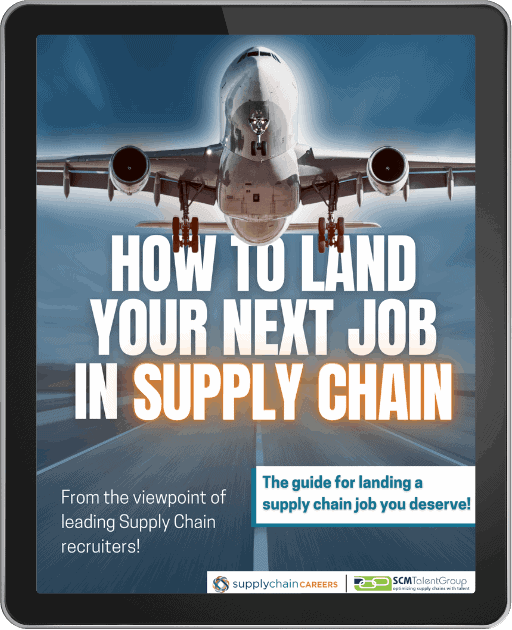
Supply Chain Management Careers – Overview of Career Options
Supply Chain Management Careers are some of the most expansive and diverse disciplines within the business world as they encompass a broad array of interconnected activities and functions which enable commercial activities, such as procurement, logistics, inventory planning, order fulfillment, and manufacturing.
Likewise, the paths of these careers are expansive and diverse, particularly so because supply chain touches almost every industry in almost any type of company, from private to public to government to non-profit.
If you’re considering or beginning a career in supply chain management, you may find it a bit overwhelming to gain a comprehensive understanding of the different paths to choose from within this field- and ultimately decide where to build your career.
The good news is that it’s tough to make a bad decision, as hiring is very active across the entire supply chain spectrum with some exceptions in a few industries and job disciplines. Supply chain offers flexibility as well. If you find yourself working within a company, function, industry, or job that you don’t like, with some effort you can always switch career paths. Know that it’s common to go through a bit of trial and error to select and optimize a career path that best suits your unique career goals and aspirations.
I’ve put together a high-level overview of the various career paths and top supply chain management jobs. This may help you understand what to consider when evaluating and selecting the right supply chain career path for you – from an industry, functional, and service provider perspective. Too many supply chain professionals don’t really fully apply themselves to their supply chain job, which creates more and more opportunities for success for those willing to work hard at things like inventory management and other supply chain processes. The supply chain management job market is robust and has more jobs than people to fill them! You may not even need a supply chain management degree to get a job but it sure can’t hurt!
Industries (Shippers)
In general, companies that manufacture and/or sell physical products or finished goods are commonly referred to as “shippers.” Companies that provide services and/or products to shippers are commonly referred to as “service providers.”
Supply chain spans most industries therefore it’s important to consider which industries are particularly interesting or appealing to you; whether it’s Food and Beverage, Consumer Goods, Energy & Utilities, or Healthcare, for example. Supply chain managers can be found in most any industry.
You’ll want to gain an understanding of how supply chains differ across industries as well as from a career path perspective. For example, if you want to work in a company that manufactures products, then you need to understand that Retail and Wholesale industries wouldn’t be the best options as they don’t manufacture any goods. Good news is that there are lots of skills that are transferable into supply chain. You could be highly qualified and not even know it!
Lastly, it’s very important to pay close attention to industry trends as jobs that exist today may not exist in the near future due to technological advancements, industries on the decline e.g. coal, and outsourcing of certain jobs to low-cost countries. Below is a sample list of industries that you should be familiar with. Take the time to research the various career paths from an industry perspective so you can make the best decisions based on your career goals.
- Automotive
- Consumer Packaged Goods
- Retail
- Manufacturing
- Chemicals
- Medical Devices
- Healthcare
- Energy & Utilities
- Wholesale Distribution
- Consumer Electronics
- Aerospace & Defense
- And many more
If you want a more detailed first hand account, be sure to check out our “Day in the Life” podcast series! It has also been said that a lot of supply chain jobs are recession proof! No need NOT to get into the field!
Service Providers
Service providers can vary from companies that design, develop and deploy supply chain software solutions to companies that contract manufacture on behalf of a shipper to transportation carriers that transport raw materials and finished goods via truck, rail, ocean, or airplane from point A to B. There are a plethora of companies that provide supply chain consulting services as well, ranging from the Big 4 accounting firms to small boutique firms.
One of the main positives of working on the service provider side is that you would likely receive the opportunity to work with a variety of different companies that can span different industries.
- Supply Chain Technology Firms – WMS, TMS, ERP
- 3rd Party Logistics (3PL) and 4th Party Logistics (4PL)
- Carriers – LTL, Truckload, Ocean, Intermodal, Rail, Air Freight
- Freight Forwarders, Non Vessel Owning Common Carrier (NVOCC)
- Advisory / Management Consulting – Big 4, Niche/Boutique
- Supply Chain Associations – APICS, ISM, CSCMP, WERC
- Training & Academia / Universities
- Supply Chain Recruiting & Executive Search
- And many more
Then there are also associations devoted to supply chain that provide content, training, and certification programs, which can help further your supply chain knowledge while building out your professional network. Of course, there are career paths on the association side as well as in academia and training if this is your passion.
Remote/Hybrid Supply Chain Management Career Options
The world of supply chain management doesn’t necessarily lend itself well to remote supply chain jobs. As you can imagine, a lot of established supply chain professionals are opting for jobs that allow for this type of flexibility. But with the growth of machine learning, automation, robotics, and other digital technologies, more remote gigs are opening up for more supply chain management professionals. These digital assets allow for management to better track the work of their analyst teams from afar. Control towers and Enterprise Resource Planning (ERP) software has revolutionized the practice and made remote work a lot more accessible than previously thought possible.
Functional Areas of the Supply Chain
As touched on earlier, supply chains differ in many ways – from company to company and industry to industry. There’s no such thing as a “one supply chain model fits all” because some functional areas which exist in one company’s supply chain and can be absent in another.
To keep it simple for career path explanation purposes, let’s review the core functions that “commonly” (but not always) exist within a supply chain organization. If you are unfamiliar with some of these terms I recommend conducting research in Google, YouTube, the APICS Dictionary, and other online sources to learn more. You can search for these terms on job boards as well, such as Indeed.com, CareerBuilder, and even LinkedIn, to better understand the typical roles, responsibilities, and job qualifications.
- Plan – Supply Planning, Forecasting / Demand Planning, Production Planning, Capacity Planning, Inventory Management, Sales & Operations Planning (S&OP), Integrated Business Planning (IBP)
- Make – Production (of materials or goods), Maintenance, Engineering, Quality, Planning & Scheduling, Purchasing, Warehousing with “supporting functions” that typically include Finance, HR, Health & Safety, and/or Continuous Improvement.
- Buy/Source – Strategic Sourcing, Procurement, Commodities Management (Direct Spend), Category Management (Indirect Spend)
- Deliver – Logistics, Transportation, Warehousing, Import/Export and Reverse Logistics (e.g. returns management)
Company Type
It’s important to consider company size and ownership when choosing a career path as these can vary quite a bit and impact your career satisfaction and trajectory levels. Companies can vary greatly by size, sector, and scope.
- Size: start-up, small, mid-size, large
- Sector: public, private (including family-owed), non-profit, private equity-owned, venture capital-backed
- Scope: domestic, regional, and/or international; multi-product/divisional or focused
In large corporations, you will typically start working within a segment or functional area of the supply chain with access to a lot of resources and more career paths to choose from. In smaller companies, you may wear multiple hats with broader exposure to the supply chain but with access to fewer resources and likely fewer career advancement opportunities. The job market in this field is thriving so don’t hesitate to get into it now!
Supply Chain Support Functions
Don’t neglect the possibility of working in a business function that supports supply chain management such as supply chain finance or continuous improvement. I like to think of these as “hybrid” roles as while you may not report up through the supply chain department, you are providing critical support services to the department. Career paths within this area include the following focus areas, including my own specialty, supply chain recruitment:
- Sales & Marketing (within a Service Provider)
- Finance & Accounting
- Sustainability
- Health, Safety & Environmental (HSE)
- Operational Excellence / Continuous Improvement (Lean / Six Sigma)
- Human Resources
- Supply Chain Recruitment / Staffing
- Quality Assurance
- Information Technology
Where to Get Started
Unsure where to get started? Check out our Supply Chain Careers Podcast.
Another great resource for a better understanding of the myriad supply chain management career paths is through free resources like YouTube. Here you can run some searches on terms such as “careers in supply chain” to identify sources of video content. If you’re fairly new to supply chain management, be sure to check out the YouTube channel for Arizona State University’s School of Business.
APICS offers the most popular and respected supply chain certifications so be sure to consider their training & certification offerings as many employers prefer candidates that have APICS certifications such as APICS CSCP, CPIM, and CLTD. Be sure to check out ASCM’s new resources for transitioning into a supply chain management career.
Another great avenue for expanding your supply chain knowledge base is Feedspot’s “Top 75 Supply Chain Blogs” by setting up a feedly.com account. Using this free tool allows you to track all blog posts that you want to review in one place on your desktop, tablet, and mobile phone. I have been using Feedly for years to keep a strong pulse on trends and breaking news within the field of supply chain management. Highly recommend it for ALL supply chain professionals!
Of course check out the SCM Talent Group’s Content Hub, as this is a place where we release fresh new content around all things supply chain, including supply chain career development, leadership tactics, and even what it’s like to work a day in the life of supply chain positions!
I hope this gives you a good overview of the various career paths inside supply chain management. Remember, a lot more of these jobs can be done remotely, so don’t hesitate to seek virtual positions or demand hybrid arrangements in your comp packages.
To your success!

